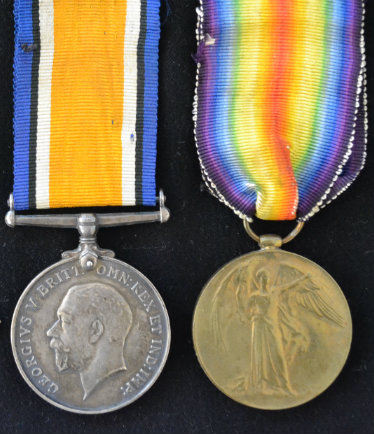Personal Details
Born: 24 September 1887 in Whitchurch, Shropshire.
Family: The fifth son of Henry and Elsie Reid of Park Street, Wellington, Shropshire. Arthur married Dora Sylvia Mary Meaton in 1915 and together they had 2 children – Doreen and Sheila.
Civilian Occupation: In 1911 he was employed as a florist; in 1939 his occupation was seedsman, florist and fruiterer.
Residence: In 1911 he was boarding at 74 Park Street, Camberley, Surrey. In 1939, the family were living at 7 Oxford Street, Newbury, Berkshire.
Died: On 8 February 1975 aged 87.
Military Details
Regiment: Royal Air Force (previously Royal Naval Air Service)
Rank: Batman
Service Number: 239692 (previously F39692)
Date of Enlistment: 12 October 1917
Date of Discharge: 30 April 1920
Reason for Discharge: Demobilisation
Arthur was awarded the Campaign Medals (British War Medal, and Victory Medal).

The British War Medal (also known as 'Squeak') was a silver or bronze medal awarded to officers and men of the British and Imperial Forces who either entered a theatre of war or entered service overseas between 5th August 1914 and 11th November 1918 inclusive. This was later extended to services in Russia, Siberia and some other areas in 1919 and 1920. Approximately 6.5 million British War Medals were issued. Approximately 6.4 million of these were the silver versions of this medal. Around 110,000 of a bronze version were issued mainly to Chinese, Maltese and Indian Labour Corps. The front (obv or obverse) of the medal depicts the head of George V. The recipient's service number, rank, name and unit was impressed on the rim.
The Allied Victory Medal (also known as 'Wilfred') was issued by each of the allies. It was decided that each of the allies should each issue their own bronze victory medal with a similar design, similar equivalent wording and identical ribbon. The British medal was designed by W. McMillan. The front depicts a winged classical figure representing victory. Approximately 5.7 million victory medals were issued. Interestingly, eligibility for this medal was more restrictive and not everyone who received the British War Medal ('Squeak') also received the Victory Medal ('Wilfred'). However, in general, all recipients of 'Wilfred' also received 'Squeak' and all recipients of The 1914 Star or The 1914/1915 Star (also known as 'Pip') also received both 'Squeak' and 'Wilfred'. The recipient's service number, rank, name and unit was impressed on the rim.

